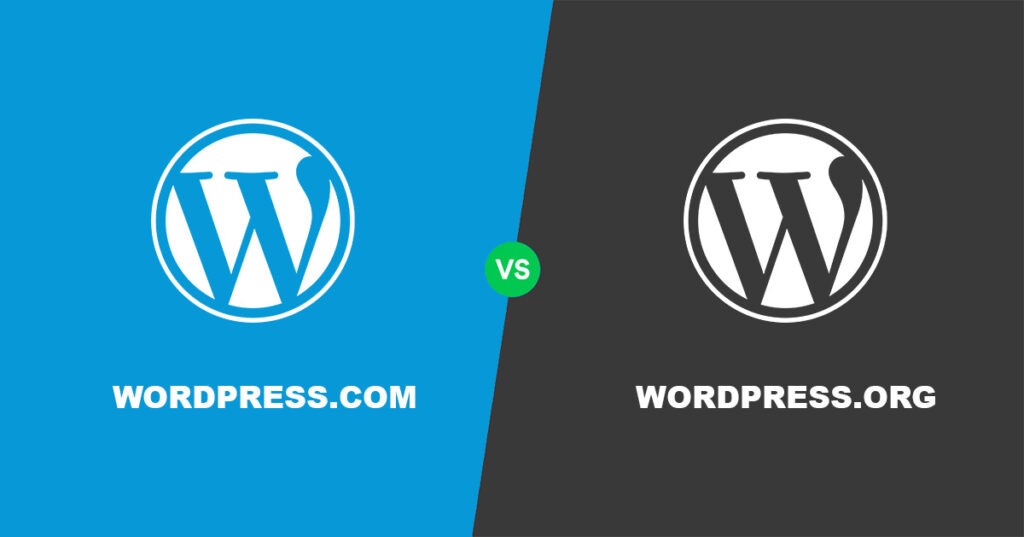If you’ve ever searched for “how to start a blog”, you’ve probably stumbled across two versions of WordPress: WordPress.com and WordPress.org.
At first glance, they look almost identical — same name, same logo, both promising to help you build a website. But here’s the catch: they’re not the same thing at all. And picking the wrong one can lead to headaches, wasted money, and a whole lot of “I wish I’d known this earlier.”
Think of it like this: WordPress.com is like renting an apartment. The landlord (WordPress) takes care of the maintenance, but you have to follow their rules. WordPress.org? That’s like owning your own house. You can do whatever you want — but you’re also the one who fixes the leaky roof.
In this guide, we’ll break down the differences between the two, go over the pros and cons, compare costs, and help you figure out exactly which one makes sense for your blog or business. By the end, you won’t just know the difference — you’ll know which one’s yours.
WordPress.com vs WordPress.org: Quick Overview
Before we dive into the nitty-gritty, here’s a snapshot of what sets them apart.
WordPress.com: The Easy-Peasy Option
It is a hosted blogging platform. You sign up, choose a plan, and start building — no need to worry about servers, updates, or security patches. It’s the “done-for-you” option, but that convenience comes with trade-offs: limited customization (unless you pay for higher tiers) and certain rules you can’t bend.
WordPress.org: The Build-Your-Own Vibe
On the other hand, it is self-hosted. You download the WordPress software for free, install it on your own web hosting, and customize it however you like. This gives you complete control over your site’s design, functionality, and monetization — but you’re also responsible for maintenance, backups, and security.
A Quick Analogy
If you just need a simple site without tech hassles, WordPress.com might be your lane. If you’re building a serious blog, business site, or want full flexibility, WordPress.org is usually the better long-term bet.
Key Differences Between WordPress.com and WordPress.org
While both platforms share the WordPress name, they cater to very different needs. Let’s break down the main differences so you can see which one fits your goals.
1. Hosting: Who Runs Your Site?
- WordPress.com – Hosting is included. You don’t need to find a provider or set anything up—they do it for you.
- WordPress.org – You arrange your own hosting with companies like Bluehost, SiteGround, or Hostinger. Starter plans usually cost $30–$100/year.
💡 Think of hosting like renting a space for your shop. With WordPress.com, they give you a spot in their mall. With WordPress.org, you pick your own location—and own the keys.
2. Site Ownership: Who’s Really in Control?
- WordPress.com – Your site lives on their servers. If they suspend your account, your site could disappear overnight.
- WordPress.org – You own everything—your files, content, and database.
Bottom line: If you want full control and no landlord, go with WordPress.org.
3. Domain Names: Your Web Address
- WordPress.com (Free Plan) – You get something like yourname.wordpress.com. Not very brandable.
- Paid Plans – You can connect your own domain (e.g., yourname.com).
- WordPress.org – Any domain you want, right from the start.
A custom domain feels like going from a nickname to your real name—it’s professional, trustworthy, and better for branding.
4. Design Freedom: How Much Can You Customize?
- WordPress.com – Free plan has limited themes and customization. Premium or Business plans unlock more, but you’re still playing by their rules.
- WordPress.org – Full freedom. Choose from thousands of free and paid themes. Tweak colors, layouts, and fonts—or build from scratch if you know code.
If design freedom is a priority, WordPress.org wins hands down.
5. Plugins: Power-Ups for Your Site
- WordPress.com – No plugins on the free plan. Some on Premium. Full plugin access only with the Business plan (~$300/year).
- WordPress.org – Over 59,000 free and paid plugins. Add anything—from SEO tools and security to eCommerce and email marketing.
Plugins are like apps for your site. They do cool stuff, like:
- Boost your SEO (think Yoast or Rank Math).
- Speed up your site (WP Rocket’s a fave).
- Add contact forms, shops, or analytics.
- Keep hackers out (Wordfence is solid).
6. Monetization: Can You Make Money?
- WordPress.com –
- Free plan: No monetization.
- Premium: Limited to WordAds (and they take a cut).
- Business: More options, but pricey.
- WordPress.org – Unlimited monetization options: AdSense, affiliate links, online stores, memberships—you name it.
7. SEO & Analytics: Getting Found Online
- WordPress.com – Basic SEO tools. Google Analytics requires a Business plan.
- WordPress.org – Full SEO control. Install plugins like Yoast or Rank Math. Connect Google Analytics in minutes.
If growing traffic is your goal, .org gives you more firepower.
8. Maintenance: Who Handles the Tech Stuff?
- WordPress.com – They manage updates, backups, and security.
- WordPress.org – You handle maintenance—but hosts and plugins can automate most of it.
9. Cost: What Will You Spend?
WordPress.org often ends up cheaper long-term—especially if you choose affordable hosting.
If you like the hands-off, no-tech route, WordPress.com can work. But if you want freedom, flexibility, and ownership, WordPress.org is the clear winner.
Pros and Cons: WordPress.com vs WordPress.org
WordPress.com
WordPress.com can feel like blogging on training wheels—it’s easy to start, but you’re riding within their lane. Here’s the real deal.
Pros
Cons
WordPress.com is beginner-friendly and low-effort, but you trade away control and flexibility. Great for casual blogging—less so if you’re building a brand or business.
WordPress.org
WordPress.org is like owning your own house—you get to decide the paint color, the furniture, and even knock down a few walls if you want. But with that freedom comes responsibility.
Pros
Cons
If you want ultimate flexibility and long-term growth, WordPress.org is the way to go. Just be ready to handle a bit of the behind-the-scenes work—or hire someone to do it for you.
Which One Should You Pick?
It really boils down to one big question: How much control do you want over your blog?
Think of it like renting vs. owning a home:
- Renting (WordPress.com) – Less work, fewer headaches, but limited freedom.
- Owning (WordPress.org) – More freedom, more work, but it’s truly yours.
My take? If you’re aiming to make money, build a brand, or fully customize your site, start with WordPress.org from day one. If you just want to write and share your thoughts without touching the tech stuff, WordPress.com is the easier path.
Quick Comparison Table
Here’s the whole picture:
| Feature | WordPress.com | WordPress.org |
|---|---|---|
| Hosting | Included | You pick your host |
| Setup | Super easy | Takes a bit of work |
| Domain | Branded free domain | Any custom domain |
| Themes | Limited unless you pay | Unlimited, free or paid |
| Plugins | Business plan only | Over 59,000, no limits |
| Monetization | Limited, they take a cut | Full freedom |
| SEO Tools | Basic, pay for more | Advanced plugins |
| Maintenance | They handle it | You handle (or use managed hosting) |
| Cost | Free to $300/year | ~$40–$100/year + extras |
| Best For | Hobbyists, beginners | Serious bloggers, businesses |
How to Get Started with Your Choice
Once you’ve decided between WordPress.com and WordPress.org, it’s time to roll up your sleeves and get moving. Here’s a quick roadmap for each option.
If You Pick WordPress.com
- Sign up for an account – Head to WordPress.com and create your free or paid account.
- Choose a plan – Free for casual blogging, or upgrade for more storage, a custom domain, and advanced features.
- Pick a theme – Browse their built-in library and activate a design you like.
- Start writing – Use the block editor to create posts, add images, and publish your first entry.
If You Pick WordPress.org
- Get hosting & a domain – Sign up with a reliable host like Hostinger, Hosting.com, or Bluehost.
- Install WordPress – Most hosts offer 1-click WordPress installation.
- Choose a theme – Install a free or premium theme that fits your style and purpose.
- Add plugins – Boost your site with SEO tools, security plugins, and performance enhancers.
- Publish your first post – Create and share your first piece of content to kick things off.
Pro tip: If you’re still unsure, you can start with WordPress.com to get comfortable, then migrate to WordPress.org later. Just remember—it’s easier to start on WordPress.org from the beginning if you plan to grow big.
Wrapping It Up
At the end of the day, both WordPress.com and WordPress.org let you tap into the power of WordPress—it’s just a matter of how much control, flexibility, and responsibility you’re ready for.
- Pick WordPress.com if you want a hassle-free start, zero maintenance, and don’t mind some limits on customization and monetization.
- Pick WordPress.org if you’re ready to take full ownership of your site, customize every detail, and grow without boundaries.
If your blog is just a personal project or a creative outlet, WordPress.com will feel like a cozy apartment—easy to move into, easy to manage. But if you’re building a business, brand, or long-term online presence, WordPress.org is like owning your own house—you call the shots, and the possibilities are endless.
My advice? Think about your end goal before you start. The right choice today will save you time, money, and headaches down the road.
Frequently Asked Questions
Can I switch from WordPress.com to WordPress.org?
Yes. Export your content from .com. Import it to .org. Takes a little time, but it’s doable. I did it in a weekend.
Is WordPress.org really free?
The software’s free. But you pay for hosting and a domain. Think of it like buying a plot of land for your site.
Do I need to code for WordPress.org?
Nope. Themes and plugins do the heavy lifting. Coding’s only if you want to get fancy.
Is WordPress.org hard to maintain?
It takes some effort. But plugins like UpdraftPlus handle backups. Managed hosts like SiteGround do the rest.
Which one’s cheaper in the long run?
Tricky question. Depends on your vibe. WordPress.com has a free plan, but paid ones run $48–$300 a year. Want cool features? You’re paying more. WordPress.org needs hosting and a domain—say, $40–$100 a year. But you get way more control. I run three sites on WordPress.org with one cheap hosting plan. Saved me cash compared to .com’s Business plan. Long-term, .org often wins for flexibility.
Which one’s easier for beginners?
WordPress.com, hands down. Sign up, and you’re blogging in minutes. No tech skills needed. It’s like riding a bike with training wheels. WordPress.org? You pick a host, install the software, set things up. Sounds scary, but most hosts offer one-click installs. I was nervous at first, but my host’s setup wizard made it a breeze.
Which one’s safer from hackers?
WordPress.com’s got your back. They handle security, backups, updates. It’s like living in a gated community. WordPress.org? You’re the security guard. Set up plugins like Wordfence or pick a managed host like Kinsta. I use a security plugin on my .org site. Takes five minutes to set up. Keeps me safe.


